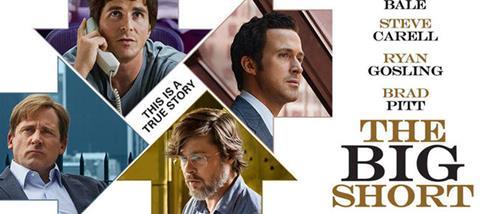
Nominated for Best Picture at the Oscars, The Big Short tells a story of huge importance and complexity, in a cinematic style that is wonderfully engaging and accessible.
Adam McKay, the film’s director and co-writer, has been described as the cinematic equivalent of a jazz musician - his films are outrageous, anarchic and chaotic but have a clear structure and message. Formerly a writer and director for Saturday Night Live (the TV series known for satirical sketches and monologues that raise important political and economic questions), in this film Adam McKay clearly shows his passion for helping a wide audience to understand the causes of the devastating banking collapse in 2007-8.
In an irrepressibly gripping style, The Big Short tells the true story of a ragtag group of Wall Street outsiders who bet against the banks and won. These realistic characters are wounded and flawed people wrestling with questions at all sorts of levels. How could the banks have been so stupid and greedy to base high-price investments on effectively worthless sub-prime mortgages? Has the financial system perpetrated an immense fraud against ordinary hard-working people? Is there really a bubble about to burst?
Like the little boy in classic fable The Emperor’s New Clothes, why does no-one else see the economic time-bomb that is about to explode? Perhaps the greatest underlying dilemma of all is, given that they must use a similar type of financial derivative to bet against the banks, is it morally right for them to profit personally from the collapse of the global economy?
I would love to have been a fly-on-the-wall when the filmmakers originally pitched their idea. Is it possible to make a popular, entertaining, film about the dangers of derivatives; about the risks of Mortgage-backed Securities; and about the consequences of Collateralized Debt Obligations? Well, Adam McKay certainly has done that. And no doubt the short vignettes he includes in the film, explaining these complex financial instruments, will be clipped out and used by economics teachers for many years to come.
As well as taking us under the surface of the financial world, the film also takes us beneath the skin of the people working in that sector. Before the banking collapse affected the lives of many ordinary people, the assumptions upon which it was based affected the characters of many bankers themselves.
The Big Short is one of a series of current films based upon an historical episode. When films are made about a true story they not only recount the events on which they are based but also typically consider the truth of a theme that they explore – thus using the word ‘true’ as an adjective to describe a concept. So, Suffragette considered ‘true sacrifice’; The Lady in the Van pondered ‘true friendship’; The Danish Girl explored ‘true identity’. And the forthcoming 13 Hours: The Secret Soldiers of Benghazi will consider ‘true courage’; The 33 will ponder ‘true hope’; Spotlight will explore ‘true honesty’… and so the list goes on. In the midst of this run of films based on true events, The Big Short explores the very important question of ‘true value’. Is financial price the real determinant of a true value?
It is entirely coincidental, but interestingly fortuitous, that the release of this film comes at the same time that the Czech economist Tomáš Sedlá?ek is packing lecture halls and theatres across Europe with a stage version of his popular book Economics of Good and Evil in which he presents an iconoclastic perspective on fundamental economic assumptions.
In a recent public interview at University College London he talked about the danger of confusing price and value. In doing so he reflected on the importance of the Bible in considering the economic assumptions of our contemporary world. So, perhaps, as we help people to explore the concept of ‘true value’ which is raised in The Big Short, we might also help them to consider the Bible’s teaching on this theme. Indeed, we might help them find that whilst this true-life film, and the others released around it, uses ‘true’ as an adjective to describe a concept, the Bible takes us one step further. The Bible also uses ‘truth’ as a noun - when Jesus said ‘I am the truth’. Perhaps we might help people to discover that it takes a personal encounter with that truth to discover true value in this world?
Click here to request a free copy of Premier Christianity magazine



























